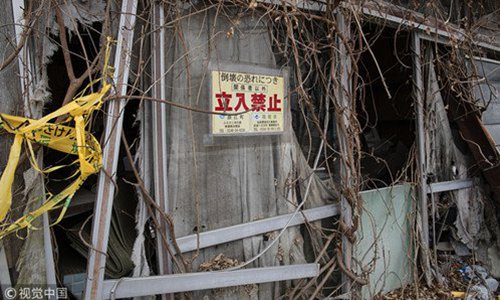
The 8th anniversary of the 2011 earthquake and tsunami in Japan. A photographer took pictures of the ruins of the hard-hit Namie in Fukushima, Northeast Japan. Vacant storefronts line the once prosperous streets. More than 20,000 people were killed by the disaster, and more than 50,000 people still remain displaced from their homes up to now. Photo: VCG
Chinese and South Korean netizens are calling on Japan to deal with dozens of cracks discovered in facilities containing radiation at the Fukushima nuclear plant as soon as possible as they are worried radioactive pollution will harm the environment and eventually their health.
South Korean media Arirang News said on Monday that 41 cracks were found in the plant's concrete floor, citing Tokyo-based Yomiuri Shimbun.
"Tokyo Electric Power Company appears to have neglected the facilities, with inspectors having discovered weeds growing through the concrete," according to Arirang News.
While the Japanese government insists it's safe, problems are continuing to sprout up in the area and inspectors believe there's a danger that radioactive substances may have seeped through the cracks and into the groundwater, the Arirang report said.
The cracks have sparked concerns among Chinese and Korean netizens.
Some netizens said they worried over possible impact of radioactive substances discharged into the Pacific and called on Japan to initiate viable measures.
Lin Boqiang, director of the China Center for Energy Economics Research at Xiamen University, told the Global Times that radioactive contamination of the ocean is a concern not only for Japan but for neighboring countries including China and South Korea.
Even if the 41 cracks were repaired, nuclear penetration would not stop as rains and typhoons continue to erode the crippled plant, Lin said, noting that the radioactive contamination can also harm neighboring residents' health if it is released into the Pacific.
According to Arirang's report, bags containing radioactive waste were found floating in a nearby river following a massive typhoon that struck Fukushima last month.
The Daiichi Nuclear Power Plant in Fukushima went into meltdown and released radioactive material in the aftermath of a tsunami in March 2011.
The Fukushima disaster cast doubts over the safety of nuclear power worldwide, leading China to launch a campaign to review and upgrade the safety system of all nuclear power stations in the countries.

